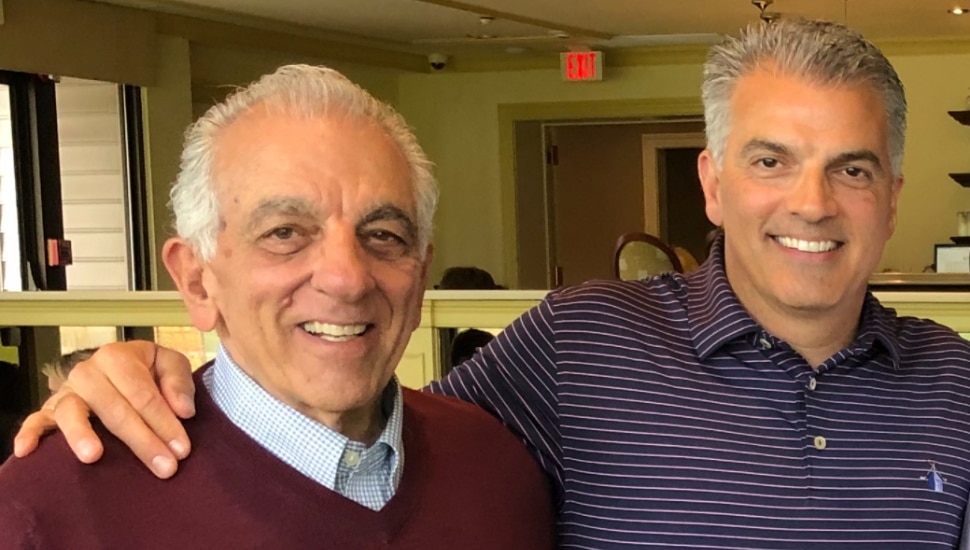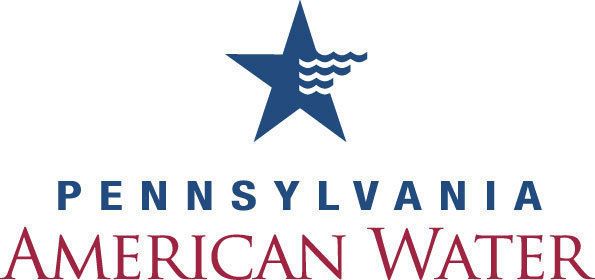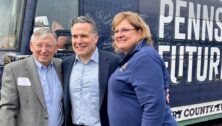Montgomery County Leadership: Thom Chiomento, Vice President, Pennsylvania American Water

Thom Chiomento, Vice President of Pennsylvania American Water, spoke to MONTCO Today about growing up all over the world thanks to his father’s job in the Navy. He used sports, from baseball to soccer to wrestling, as a way to adapt and make friends.
Chiomento discussed why he chose to go to West Chester University and why he was eager to finish college and start working. He recalled the mentors who helped him get involved with the Delaware County Chamber of Commerce and how Pennsylvania American Water is achieving growth while staying affordable and safeguarding the environment.
Where were you born, and where did you grow up?
I was born the youngest of three kids, and the only boy, in Bermuda. My father was in the Navy, and they gave him a cushy assignment in Bermuda after three tours in Vietnam. I was born there, but my mom is from Glenolden, Delaware County. My dad’s family is from Abington and Brooklyn.
What did your parents do?
My father served in the Navy until I was in college. My mom stayed home until I was in high school, and then began her career in social services for the Navy. As a result of my father’s career, I lived all over the place, but the Philadelphia area was always home because this was where our relatives were. I landed at West Chester University, which brought me to this region permanently.
How did you find your roots at each new place?
I went to 10 different schools from kindergarten through 12th grade, and I didn’t know any different when it came to “finding roots.” I just knew that every 24 to 48 months, I had to go make new friends. My mom would make my sisters and I go knock on the neighbors’ doors and say, “Hi, we’re new. Do you have any kids we can play with?” And the communities we moved to were usually filled with other transient military kids, so they were typically accepting of new faces.
What memories stay with you from growing up and moving all the time?
The main thing was that my dad’s job was the priority, so we went where he went to support him. What I learned from the constant moving was that your family is the one consistent thing in life. Friends come and go, but your family is forever. My kids have lived in pretty much the same place their whole lives, but my wife, Kim, and I have tried to raise them to place a priority on their relationships with their siblings and their extended relatives. The other big lesson for me was that change offers opportunity. I was always very sad to leave my friends and the communities we lived in. I never thought I would like the new place we were moving to but, looking back, it always worked out that I loved the next place as much as the last. I just had to give it a chance.
Did you play any sports when you were growing up?
Yes, I did. My parents were great about signing me up for different sports. Looking back, I think part of my mom’s motivation for signing my sisters and me up for activities was that she needed a break! But I also know my mom felt we needed to be active and playing sports was a great way to make new friends. My dad loved golf and he started me out at a young age, but baseball was my favorite sport.
Were you good at baseball?
I was pretty good. I made all-star teams in Little League growing up. But my first two years of high school were spent at a little American school in Sicily, and they had no baseball or football teams. So, I took up soccer and wrestling and played those sports throughout high school. When I came back to the States for my junior and senior years, I was excited to make the baseball team, even though I hadn’t played for two years.
You’re a pretty good adapter.
You know, change happens, and you have to figure out how to make the most of it or you’re going to be miserable.
What about part-time jobs when you were growing up?
I had summer jobs in high school. My first couple of summer jobs had me moving pallets around in warehouses. But the coolest job I had was cooking crabs at a local crab house in Maryland.
What skills did you learn in those jobs that still stay with you today?
It’s funny: Both in the warehouse and in the kitchen, I learned the value of keeping the workplace clean and organized. I find that I still value that today in my work and in everyday activities like cooking. I’m a clean desk guy; I don’t like things to be messy. I like things to be thought through and organized and I don’t like surprises.
What kind of music floated your boat in high school and college, Thom?
I loved heavy metal and rap. Those were the two genres that I connected with most. Rage Against the Machine, Metallica, Public Enemy, the Beastie Boys, and Run DMC still make up a good portion of my Apple Music library.
So, how did you end up at West Chester University? You could have gone anywhere to college.
My father influenced me to go there. He knows me well, and he felt strongly that I would succeed there. I got into a couple of other schools. I wasn’t a great student, but I did well enough. And he thought I would really like West Chester University, and he encouraged me to check it out.
What did he see in you that he thought you would be a good fit at West Chester?
To this day, I don’t know for sure the answer to that question. Dad’s intuition, I guess. But he said, “There’s an orientation weekend. You should go.” I went and I fell in love with it. I knew that’s where I wanted to be.
Was West Chester a good choice for you?
Absolutely. I loved it there. I was accepted into their Russian Studies program. But once I got a dose of the Russian alphabet, I immediately signed up to be a Political Science/Public Administration major. I enjoyed the practical life experiences many of the professors brought to the classroom. Political science can be a heavy topic, but I felt I was learning about it in a way that I could apply it in a practical, real-world environment.
While I loved West Chester, I was very committed to getting in and out of college as fast as I could. Back then, it seemed like everyone took five years to graduate. Not me. I hated being broke, and I wanted my own place. I couldn’t wait to get out and start working. But I enjoyed my time there and I thought it was a good fit for me. I enjoyed my classes and my professors. I did fine academically.
After you were done, did you go for an MBA?
I attended the University of Pennsylvania’s Fels Institute of Government and earned my master’s in Public Administration 10 years later.
After you graduated from college, who saw promise and potential in you and opened up doors for you?
I can’t say enough about my parents. Their parenting had the greatest influence on who I am today as a parent, a spouse, and a citizen.
From a business perspective, there really wasn’t just one person. There have been so many great mentors in my life, and they all influenced the experiences I had that helped me figure out what I liked and what direction I wanted my career to take. I had always thought I wanted to work for the State Department or on Capitol Hill. I liked the idea of public service because I had grown up in that environment. However, through an internship at the Delaware County Chamber, I was exposed to the idea of advocacy, and it piqued my interest. I thought, “This is interesting — advocating for business and free enterprise. And, I don’t have to work for the government to do it!” That excited me, and I started to see a career path in lobbying and government affairs as both promising and interesting.
A short time after I graduated, I was able to land a full-time job on the staff of the Delaware County Chamber. What I enjoyed most about my work there was interacting with the businesspeople who made up the leadership of the organization. These are people who are leaders without being elected leaders. They are leading the community and doing things for the community and our state as business leaders. That was an interesting angle that I never considered when I was in school. When you’re a young person, and you think about who’s leading our country, you immediately think about people who were elected or bureaucrats. By working at the Chamber and seeing all these businesspeople that were involved, I thought, “These are the people that are really making things happen.”
What I took away from that experience, and expanded on as my career progressed, was the value of bringing all stakeholders to the table if you really want to solve problems. Elected leaders and the bureaucracy can’t solve our society’s problems on their own. They need us — the private sector — as much as we need them, and we’ve got to work together to try to move things along. As you know, nowadays, collaboration like that is frowned upon. Things like lobbying or being actively engaged with politicians as a business isn’t always viewed positively, but it’s necessary.
How did you get to Pennsylvania American Water?
I had been at Exelon (now Constellation) for nearly 20 years. I really enjoyed my time there, but I was starting to feel like I was getting stale and was contemplating a career change. As luck would have it, I got a call out of the blue from somebody I knew from the energy industry who was now at American Water. He said, “Thom, we’re looking to add somebody in Pennsylvania. Would you be interested?”
What intrigued me most about the opportunity was that it was more than government affairs. The role would be focused on executing the company’s growth strategy, so I took the leap into business development at American Water. It was a little scary to do something completely different, but I knew I could use a lot of the skills that I learned and used very successfully throughout my career. Again, you have to view change as an opportunity. I just kept telling myself that.
We’re halfway through 2024. What are you focused on at American Water?
In my role, I’m focused on growing the business. I’m able to do that because the team at Pennsylvania American Water is the best in the world at making sure our customers are receiving great service and good value and that we’re investing properly in the systems that we own.
When we do that, it makes it easy for me to offer those same services and value to customers in communities we don’t serve yet.
My team and I work with local community leaders who may be looking to exit the water or wastewater business. We are seeing many local government leaders today who are facing significant financial challenges and capital investment needs, and they have limited or insufficient resources to address those challenges.
We try to be a solution provider for these communities. They may have issues with their wastewater system and be under a consent order with DEP or EPA. We help them by taking ownership of their system and getting it back into compliance. They can use the proceeds from a sale to address their other priorities like pension obligations or capital needs, or they can lower taxes and eliminate fees.
It’s a choice for these communities; there’s nothing forcing them to do it. Our job is to put our best foot forward and to be an option for them.
Acquiring little systems is a lot of work, and it’s not a quick process.
No, it’s not. Most of the local government-run wastewater systems we have acquired have been under some sort of consent order by the environmental regulator. A consent order is used by DEP to enforce actions against the local government-run systems because they have been polluting or endangering the state’s rivers and streams. That’s a sign there has been a lack of investment in the system or poor management. It happens more than you think, and that’s where we come in. Water and wastewater are all we do, and we’re professionals.
As an industry, we’ve got a lot of challenges ahead. We’re addressing things like PFAS and PFOA or “forever chemicals,” and lead service lines that need to be replaced. Small local government-run systems have the same challenges. Some are capable of taking them on, but many are not.
No matter who owns your water or wastewater system, addressing these challenges will require investment. We’re focused on balancing that investment with affordability.
What about people? Are you finding the right people?
The workforce challenges are real. There’s a lot of turnover in the industry, but once people are with the company, they stay for a long time. When I say turnover, I mean the aging workforce. We may have somebody who worked here for 30 or 40 years. When they retire, it’s hard to replace all that institutional knowledge.
We are always hiring because we’re growing, and when we acquire systems, we keep the incumbent workforce intact because we need them. It’s a labor-intensive business we’re in, and you physically need people. When you buy a treatment plant, you need the people who operate that treatment plant to stay. We invest in these new employees and improve their performance through training.
So, what do you do with all that free time that you have?
My wife and I have four kids, so they keep us pretty busy. Two of them, my twin boys, graduated from Penn State and Temple this year and are now gainfully employed. My middle daughter will be starting her junior year at Wofford College in Spartanburg, S.C., and my youngest daughter is a sophomore at Kennett High School. They’re very active in sports, so every weekend we travel to go see games.
Three last questions, Thom. What’s something big that you’ve changed your mind about over the last 10 years?
Probably my faith in institutions. I had a lot more faith in our institutions growing up, the church and government for example, but that has changed. I think these institutions are flawed, but that doesn’t mean they’re all bad. It just means that you can’t blindly follow them and that you need to realize that they’re created and run by human beings, so they’re naturally imperfect.
And extend some grace to them.
Exactly. Extend them grace, but also hold them accountable.
It’s a crazy world out there, Thom. What keeps you hopeful and optimistic?
I really do believe in the goodness of people. I think people are mostly good. Maybe that’s something else that’s changed for me over the years. I don’t know that I always assumed people had good intentions. Now, I lead with that. Let’s go into the conversation or the situation assuming that intentions are good.
Finally, Thom, what’s the best advice you’ve ever received?
I have a bunch that I live by. If I had to pick one, I think it would be, “Don’t get outworked.”
When it came to sports, my dad always said you may not be the most talented on the field, but don’t get out-hustled. People appreciate work ethic, and if they see you’re working hard, that counts for a lot. I’ve applied that lesson to all aspects of my life.
Whether it’s business, life, or whatever — don’t let anybody outwork you.
Stay Connected, Stay Informed
Subscribe for great stories in your community!
"*" indicates required fields






![95000-1023_ACJ_BannerAd[1]](https://montco.today/wp-content/uploads/sites/2/2023/03/95000-1023_ACJ_BannerAd1.jpg)





























![ForAll_Digital-Ad_Dan_1940x300[59]](https://montco.today/wp-content/uploads/sites/2/2022/06/ForAll_Digital-Ad_Dan_1940x30059.jpg)



